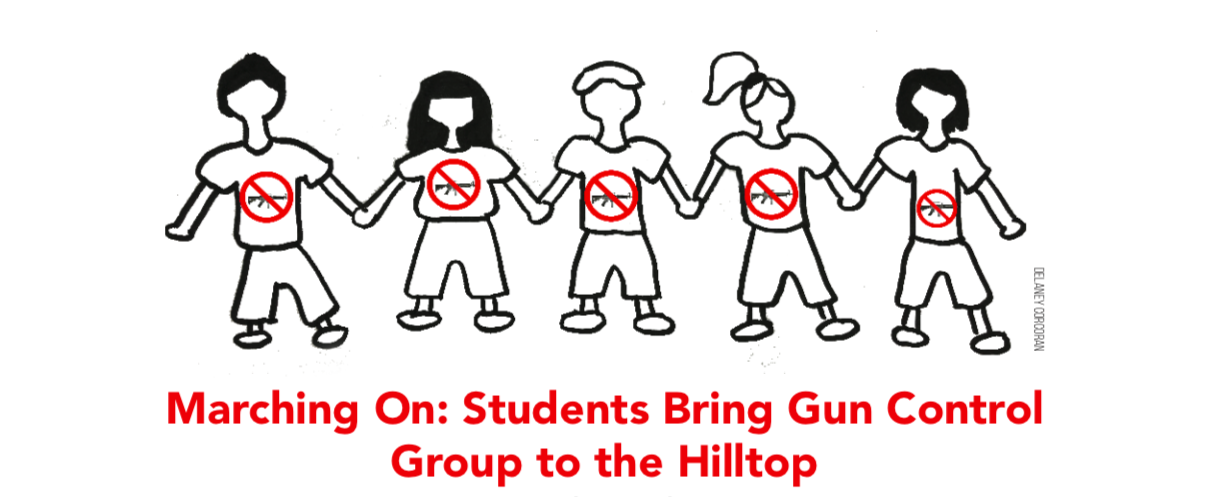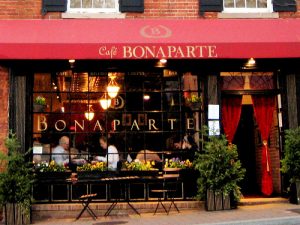When Kira Pomeranz (COL ’22) talks about gun violence, she gets intense, waving her hands and sighing about the enduring prevalence of the problem.
“Quite frankly,” Pomeranz said, “the reason I am so passionate about this issue is because I see it as a problem with a very simple answer.”
Pomeranz, one of the leaders of Georgetown’s new chapter of March for Our Lives, was surprised to find that the university did not already have a chapter or any other group with a similar mission of preventing gun violence.
“I was disappointed when I came to campus because I don’t see gun control as a partisan issue,” Pomeranz said. “It’s something where, in certain instances, over 90 percent of Americans agree on something.” So she started reaching out and eventually joined forces with other students passionate about preventing gun violence to form March for Our Lives Georgetown early in the fall semester.
The chapter is associated with both the national March for Our Lives movement and the regional D.C. organization, which encourages local high schools and universities to found their own chapters.
Margaret Gleason (COL ’22), one of the co-chairs, explained how the club came together. “The head of the March for Our Lives D.C. is a freshman at GW [George Washington University] named Eve Levenson,” Gleason said. “I DM’ed her on Twitter, and then we started chatting from there.” From Levenson, Gleason learned about resources for starting a university chapter and then coordinated with other student leaders.
Though the chapter was organized too late to apply for official university recognition in the fall semester, Pomeranz said that its first meeting, held Nov. 19, was well-attended. “Honestly, I had very low expectations,” she said. “I thought like five people were going to come to our first meeting, and I think we had over 20 kids come.”
Since survivors of the Feb. 14, 2018, mass shooting at Marjory Stoneman Douglas High School in Parkland, Fla., founded March for Our Lives, it has emerged as the leading organization in a surge of grassroots activism against gun violence.
Parkland students took to social media, town halls, and national television to broadcast their anger with current gun legislation and the influence of the National Rifle Association. They joined groups such as Everytown for Gun Safety and Americans for Responsible Solutions in advocating for stricter gun control measures.
The momentum manifested on March 24, 2018, when hundreds of thousands of people in D.C. and—by The Washington Post’s account—more than 2 million across the nation and world marched to call for stricter gun control.
The founders and participants of the protest itself formed the organization March for Our Lives, which has held nationwide protests and walkouts, established chapters around the country, and sustained a national dialogue about gun violence.
Young people—school shooting survivors, university and high school students, and newly-of-age voters—have been especially prominent in the movement, a fact not lost on the Georgetown chapter’s all-freshman leadership team. Gleason noted that while a few upperclassmen are on the club’s mailing list, meetings have been mostly attended by freshmen.
“There are a lot of people in [the freshman] class who wanted to get involved with gun violence prevention advocacy,” said Chris Stauffer (SFS ’22), a co-chair.
Gleason admitted that the club has been limited in some ways by its young demographic. To start a club recognized by the university, and thus get access to university benefits, students must first go through the Council of Advisory Boards (CAB) and the Center for Student Engagement (CSE). “Navigating the bureaucracy of CAB and the CSE as freshmen has definitely been difficult,” she wrote in an email to the Voice. “As has recruiting upperclassman members.”
Still, at barely a semester old, the club has already jumped into action. Members attended a Nov. 8 vigil for victims of the Thousand Oaks, Ca., shooting, as well as various gun violence prevention events in the District. On Nov. 27, club leaders, along with students from George Mason University, local high schools, and an activist group called Students Demand Action, met with a legislative aide from the office of then-House Minority Leader and now House Speaker Nancy Pelosi to discuss gun control.
“We certainly want to be going to the Hill a lot and advocating for things like the repeal of the Dickey Amendment,” Stauffer said. The 1996 amendment prohibits the Center for Disease Control from researching gun violence, “[a]long with things like a universal background check system.”
“The top legislative priority for March For Our Lives is passing HR-8, which would require a background check for every gun purchase,” Gleason wrote. She hopes that the new legislative session and start to the 2020 presidential campaign will prompt action. “It cannot be just a talking point when lives are at stake.”
Although the club does not yet have university recognition, it will have a table in the unofficial student group section at the upcoming spring CAB Fair on Jan. 19. This semester, they plan to apply for official university recognition and expand the club’s on-campus presence, including through collaborations like an event in February with the Black Student Alliance.
While the Georgetown chapter will coordinate with March for Our Lives on a national level, the co-chairs hope to get involved with local issues as well. “Even though we’re kind of isolated here on our campus, we are part of the D.C. community,” Gleason said.
Stauffer said that Georgetown students have an obligation to be informed about gun violence issues that directly affect vulnerable D.C. populations, though they may seem far away from the lives of some students. “Our goal is to make sure that people in Georgetown are aware that gun violence disproportionately affects communities of color.”
“There is a lot of classism and racism that goes into gun violence that we should be talking about,” he added. “That’s what we want to bring to campus.”
Gleason believes that Georgetown students have a responsibility to make their voices heard on the issue of gun violence.
“We need to use our voices and our abilities to make a difference.”





